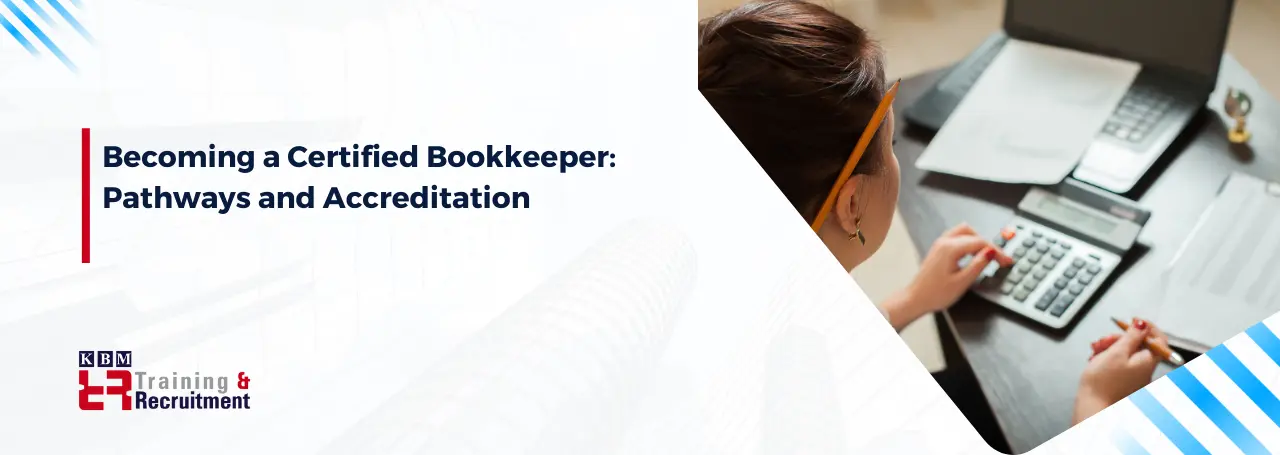Bookkeeping is a pivotal aspect of business operations that ensures the precise recording and organisation of financial transactions. Certified bookkeepers play a vital role in maintaining financial records, supporting decision-making, and ensuring compliance with regulatory requirements.
In this blog, we'll explore the pathways to becoming a certified bookkeeper, the accreditation process, and the benefits of certification in advancing your career in accounting and finance.
Understanding the Role of a Certified Bookkeeper
Certified bookkeepers are skilled professionals who record financial transactions, reconcile accounts, and produce financial reports. They are vital in helping businesses maintain accurate and up-to-date financial records.
They are indispensable in making informed business decisions and meeting regulatory obligations. Certified bookkeepers find their place in diverse industries, including small businesses, corporations, non-profit organisations, and accounting firms.
Pathways to Becoming a Certified Bookkeeper
There are several pathways to becoming a certified bookkeeper, each offering its own set of requirements and qualifications:
- Education and Training Programmes: Many aspiring bookkeepers pursue formal education and training programmes to gain the necessary knowledge and skills in bookkeeping. These programmes may include accounting principles, financial analysis, payroll management, and software proficiency courses. Institutions offering bookkeeping programmes may include community colleges, vocational schools, and online learning platforms.
- Professional organisations like the American Institute of Professional Bookkeepers (AIPB) and the National Association of Certified Public Bookkeepers (NACPB) provide certification opportunities for individuals in the field of bookkeeping. These certification programmes usually mandate passing a rigorous examination and fulfilling specific criteria related to education and professional experience. Certification signifies adeptness and capability in bookkeeping methodologies, potentially leading to improved career opportunities and higher income prospects.
- On-the-Job Experience: Some individuals acquire bookkeeping skills through on-the-job experience, working in entry-level accounting positions or administrative roles that involve bookkeeping responsibilities. While formal education and certification are valuable, practical experience can provide valuable hands-on training and knowledge in bookkeeping practices and procedures.
Accreditation Process for Certified Bookkeepers
The accreditation process for certified bookkeepers typically involves the following steps:
- Education and Training: Candidates for certification may be required to complete specific education and training requirements, such as completing a bookkeeping course or programme from an accredited institution. These programmes may cover accounting principles, financial statement preparation, and software proficiency.
- Examination: Candidates must pass a certification exam administered by a recognised certifying body, such as the AIPB or NACPB. The exam assesses candidates' knowledge and skills in bookkeeping practices, accounting principles, and relevant regulations. Preparation for the exam may involve self-study, review courses, or study guides provided by the certifying body.
- Experience Requirements: Some certification programs may require candidates to meet specific experience requirements, such as a minimum number of years working in a bookkeeping or accounting-related role. Experience provides candidates with practical knowledge and skills essential for effectively performing bookkeeping duties.
- Continuing Education: To maintain their certification, certified bookkeepers often need to participate in continuing education programmes. Continuing education ensures that bookkeepers stay updated on industry insights, regulatory changes, and best practices in bookkeeping and accounting.
Benefits of Certification for Bookkeepers
Embarking on the journey to become a certified bookkeeper brings forth a multitude of benefits, including:
- Enhanced Credibility: Certification demonstrates a bookkeeper's commitment to professionalism, competence, and ethical standards. It enhances credibility and trust among employers, clients, and colleagues.
- Expanded Job Opportunities: Certification opens doors to a broader range of job opportunities in many industries and organisations that value certified professionals with proven skills and expertise in bookkeeping.
- Professional Development: Certification programs often include ongoing professional development opportunities, such as seminars, workshops, and networking events, that enable bookkeepers to stay updated on industry trends, technologies, and best practices.
Conclusion
Becoming a certified bookkeeper is not just a career milestone, but a testament to your proficiency, credibility, and commitment to excellence in bookkeeping. It's a journey that leads to a sense of accomplishment and opens up a world of opportunities in the field of accounting and finance.
By pursuing education and training, obtaining certification, and gaining practical experience, aspiring bookkeepers can build a solid foundation for a rewarding career in accounting and finance.
For individuals interested in pursuing a career in accounting and finance, certification is not just a one-time achievement. It's a pathway for continuous learning and professional growth in the dynamic field of bookkeeping. It opens doors to new opportunities, enhances job prospects, and provides a platform to stay updated on industry trends, technologies, and best practices.






















